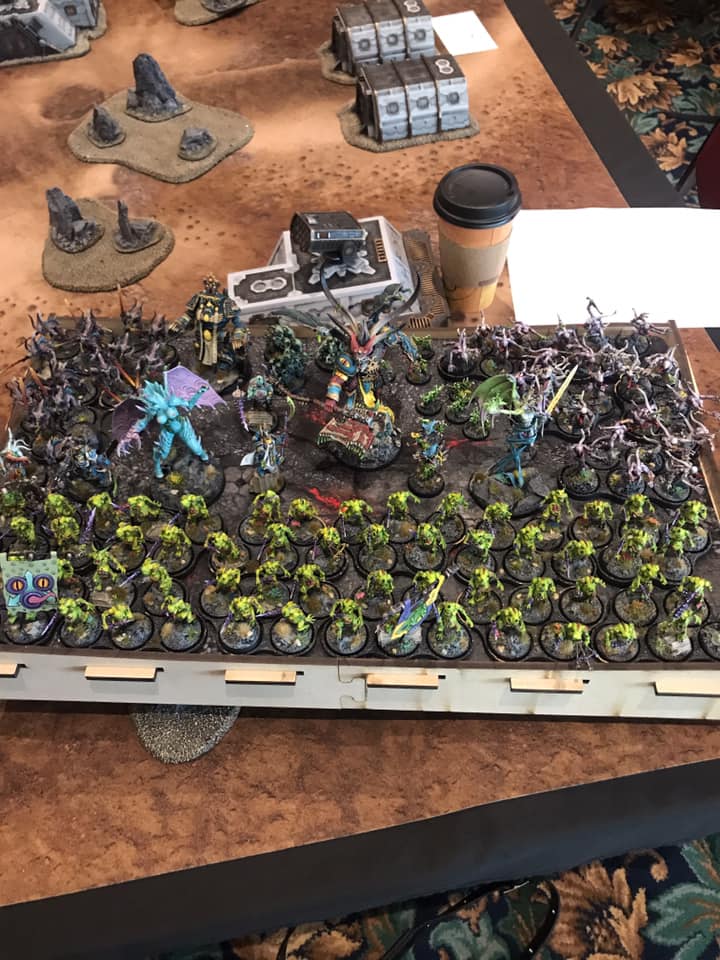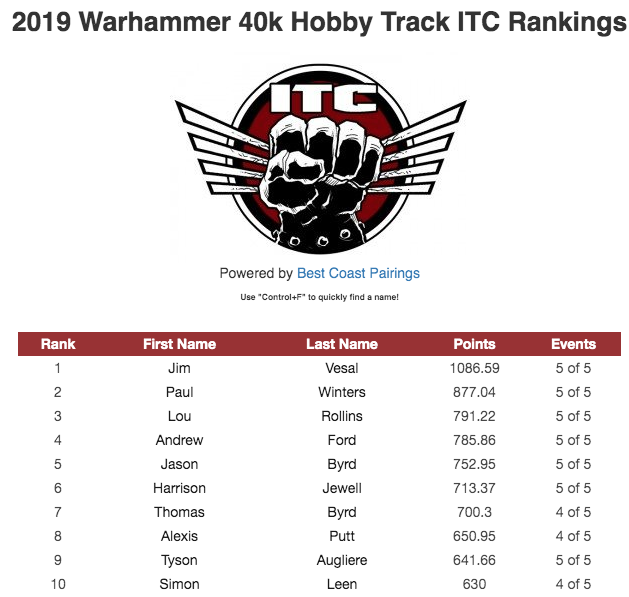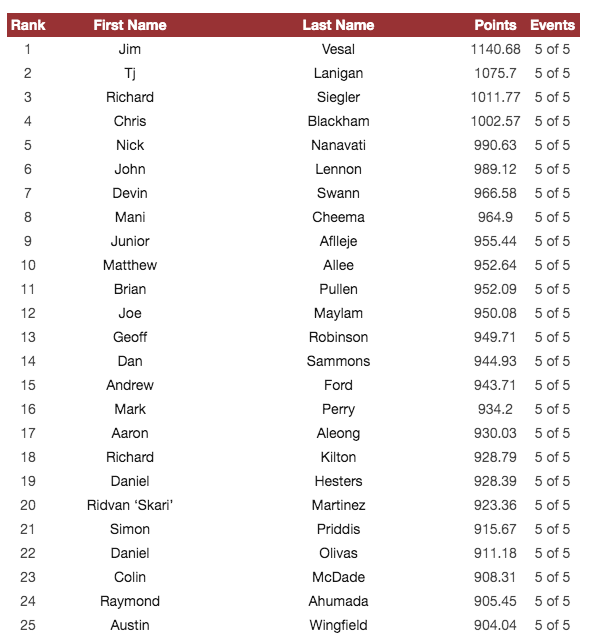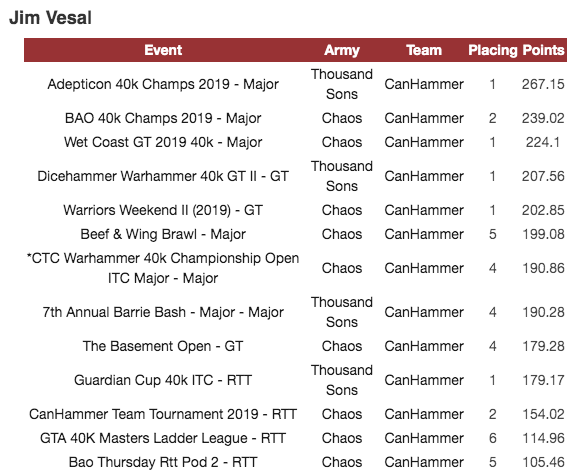Hello, fellow Warhammer 40k fans! SaltyJohn from TFG Radio, and one of the Las Vegas Open Head Judges, here to bring you another article reviewing the ITC Standings for the 2019 season with the new scoring method in place. This week we test my Hypothesis, what do the best 40k players have in common when it comes to their personal life that makes them more suited to succeed?
Before we get to the meat and potatoes of the article a few items of note. Firstly Jim Vesal’s amazing army was stolen when he was at the airport. The picture below, and link to his post about it. Keep on eye out for it! He is currently number one in the ITC Hobby track with that army, hopefully, it turns up.


I have been writing articles for Frontline Gaming on a regular, nearly weekly basis, for a few years now. I have been a head judge for LVO for 3 years and I have been playing competitively since the end of 4th edition. Through all of that and the wonders of social media, I have gotten to know quite a few of the top players in 40k fairly well. A few weeks ago I took a look at the top players in 40k and I began to realize something about them, which I wrote about in a previous article for this series. The basic idea, or hypothesis, I came up with was that with the changes we’ve seen to Competitive 40k the last 5 years, really since the ITC and LVO existed, the type of dedication required to win the ITC or LVO and be considered the, or one of the, best in the world at 40k has changed dramatically. That change includes a dramatic shift towards players with the free time and resources required to travel to multiple large events, while also playing a lot locally to keep their chops up as it were. Some of the things I began to think these players had in common were being unmarried, childless, and under 40 years old. So, with the inspiration from fellow teammate Jeff Poole, I set out to test this hypothesis by dredging the internet for info on the top 25 players in the ITC. Here are the current top players in the ITC, this is a slightly different list than the one I used. When I began the process of searching out information the last two weeks of the ITC events hadn’t been logged into the system yet.




So that’s the current top 25 followed by 3 sample players from it. I included Geoff Robinson, Rich Kilton, and Jim Vesal for specific reasons. Rich just won the Gentleman’s and Ladies GT in Vegas with his Orks, so congratulations are of course in order. But I also included him because he is an example of a player demographic in the top 25 that is rare. He is married, he has children, he is over 35, and he has only gone to two events that are of GT size or greater. Geoff is an example of a middle of the road player in terms of demographics of the top 25. He is unmarried, no children although he may consider his beloved Bulldog his child I’m not judging just stating, he is closer to 35than many, and he has gone to 4 GT/Major events and traveled for most of them. Jim Vesal our current number one is the opposite extreme of the demographics than Rich. Young, unmarried, no children, sub 35, and has traveled a lot to go to 8 events of GT size or more! There is a reason he is in the lead ladies and gentleman. Here are a few quick facts I gathered sleuthing through Facebook and the dark web. Mostly Facebook.
- Only 8 of the top 25 are married, of those 7 have children. So 32 % or roughly 1/3 of the top 25.
- That means the majority, a super majority in political terms, over 66% of the top 25 are unmarried and without children.
- 17 of the 25, 68%, have gone to 4 or more GTs/Majors.
- All but 2 have traveled more than 50 miles for 2 or more events.
- 25 of 25 have attended more than 2 GT or greater events, 23 of 25 have attended 3+.
- All but 2 are under 40 years of age. 18 of them are under 35, none of them are under 20.
So what does this information tell us? Competitive Warhammer 40k has become a game for the young. Having expendable income was always part of the equation, but expendable time and even more income for travel has become an important part of it now too. Besides just needing the requisite funds to travel the world, or your local continent, to play one of the many GTs/Majors that occur on a weekly basis now you need the time. Time, as anyone who is married and has kids can tell you, is a commodity that’s in some cases harder to come by than money. This may have already been obvious to you, and as a husband and father, I am not writing this as some kind of woe us piece, what may not be immediately evident is what this means for the hobby itself.

Many people are thinking, researching, beginning, to take 40k in a direction that is more “professional”. Meaning trying to make it something you can do for a living. That is what is so important about understanding the personal demographics of the top 25. Much like professional eSports players and professional athletes, the time commitment is so massive no person would do it without proper monetary compensation. Your prospects for marriage and family are also equally as slim if you are playing 40k often enough to be in contention for the top spot in the ITC but not making money off of it. That is a crossroads I think we are at right now in the competitive aspect of our hobby, this season. The precipice to professional versus amateur 40k is being carefully traversed by many. The players, TOs, Judges, podcasts and other content creators, etc. The number of 40k podcasts is at an all-time high, 40k based Twitch and YouTube channels pump out content regularly, there is massive saturation of ITC events every week across the world let alone in the US, the number of great 40k players trying to turn their niche fame and talent into something that supports them financially has also skyrocketed considering the fact no one was doing this 2 seasons ago. Where 40k is going to go really hangs in the balance the next 18-24 months. If people can figure out the legitimate business side of playing competitive 40k then we will see the world of comp 40k continue to grow exponentially, but if it proves to be an untenable prospect I think we will see a shrinking, or a recession of sorts, in 40k. A pullback from it as it proves to be less than a financially plausible endeavor. I don’t pretend to know which direction 40k and the ITC will go ultimately, and for all I know we passed the crucial point already, what I do know is we are going to see how all this shakes out very soon. Perhaps competitive 40k and the ITC will simply solidify into what it currently is, a competition for the young, somewhat well off, unmarried, childless men and women who have the time/money/inclination to try and conquer the world of competitive 40k in the ITC era.
As always, let me know what you thought of the article in the comments!
And remember, Frontline Gaming sells gaming products at a discount, every day in their webcart!



Hey SaltyJohn, I like the evaluation you did and it matches the perception. However, I am not sure I agree with the statistical method to come to the conclusion. To measure the outcome of wether more players of the age of twentyish with no kids are playing on a top tier level you would need to compare it to the percentage of these people of the total 40k player base.
To make it more precise – my assumption is that of the current total 40k player base much more than half of them are under 35 with no kids, since kids, marriage and age oftentimes make you drop out of the hobby out of various reasons. If that is the case, your analysis would not show that you have to be under 35 with no kids to compete, but only that the top tier base quite well mirrors the overall player base. It’s like pulling the conclusion that you have to be male to play top tier. We just don’t make that conclusion cause we know that most of the player base is male so there’s no causal connection between being male and being top tier.
I can see why you would say that about the player base being younger. However, when I judge the LVO, or travel to play in the BAO or something like that there are a lot of people there who are married with children and over 35. Is it the majority of the field, I am not sure but the majority of the field are casual players who also enjoy the competition and some time away from family to spend it with friends. I am not sure I would say “much more than half” of the player base are under 35 without kids, unmarried, etc. I do agree that looking at the overall statistic would give a more exact picture but I disagree with the assumptions you made in your assertion. Unfortunately getting that type of info would be hard without the help of the ITC/BCP in some way.
Okay, maybe I should go the distance and visit more GTs, cause the player base in my area is largely dominated by twentyish folks 🙂
About the data – before my response I actually thought about the same thing – can’t find a proper way to get information on the general player base. Would be really interesting to match the two data sets
Totally agree.
I knew there was a reason behind my poor tournament record – blame the wife, kids, & dog!
Agreed. They’re my scapegoat as well. I added a meme to the article, you inspired me.
So what your saying is we just need to get our wives to show her friends that there are unmarried men with too much time and money on their hands playing toy soldiers. Bam!
Peter Venkman: We’ve been going about this all wrong. This Mr. Stay-Puft is okay. He’s a sailor, he’s in New York. We get this guy laid, we won’t have any trouble.
Hot take, I like it.
I don’t really get the point of this “discovery”, all competitive things often rewards younger players with more time, vigour, youth. 40k is no different, to be at the top you need to put in the time. We wouldn’t expect a tennis player to be world #1 who never practices or barely played would we? What about Pro online gamers (Starcraft, DOTA etc? So why would you expect it for 40k?
it doesn’t have to be a BAD thing, in fact it’s good for there to be so much new blood in the game. You really made this article feel disdainful for those able to compete with your tone.
Hm, that was not my intention. I was trying to look at it through the lens of what this means for 40k as a whole going forward if monetization of 40k through it developing a “professional” side, or what happens should it fail to do so. Both things you bring up, Tennis and eSports, require a lot of practice but it compensates those people for their time. I think I mentioned that in the article. The point is, given the information, where is competitive 40k going to go from here. Also, Jim, you should try to remember most of what I write is somewhat tongue in cheek.
I refuse to remember anything. I am only here to stir shit and speak for the unmarried and downtrodden
LOL, ok, I accept that.
Sure its basically pay to play in a lot of ways also. Disposable income and time wins out. Same as a travel baseball team with rich parents that can afford it get the better rides and the school players who aren’t able to pay hope to be noticed.
What’s funny is that the article actually answers all the issues you mentioned
bUt MuH dOwnTRodDeN NarRaTTivE 😉
Great article John. I don’t think this is surprising; in fact, as Jim V. notes, its something everyone kind of just “knew” and is a result of the facts.
I would like to see a similar assessment at the end of the season. Do older, married players rise up in the rankings when they have the full 12 months to get big events in?
To comment on Jim V’s point about tennis and/or starcraft; 40k is a game of the mind, unlike tennis and/or starcraft which require physical skill and quick reactions and play speed. The clock adds some amount of physical restriction to the game, but 40k is a knowledge and skill based game, much like chess, so you would think that age would not have much of an impact on a player’s success. I certainly agree that practice makes perfect though.
As for the comments about the article being disdainful, I didn’t get that at all from the article. To me it was just commenting on the realities of those players who are doing well in the ITC currently. As Jim notes, it makes sense that those players with the time to dedicate to the hobby would do better than those without such time, which as he notes (and I agree with) is a good thing. The more people putting time and energy into the game means the more diversity and “meta-breaking” new lists and concepts coming out.
I tried, but there’s just no clever, funny way to deliver the punchline, “this is why we don’t see Michael Snider’s name in the tops recently”.
It’s simply just going to be true.
😉
-Casey
Team BeerHammer
LOL, Snider hate.
Well I sacrifice my children at the end of each ITC year, thus becoming childless, and ensuring my rise toward, but not all the way to, the top.
This got me thinking.
https://www.npr.org/2019/06/19/734121633/theres-more-to-look-forward-to-after-peaking-professionally
The difference between fluid intelligence and crystallized intelligence. Professions that favor fluid intelligence favor younger peak success, tech entrepreneurs and academic researchers are the example he gives. Crystalized intelligence favors professions that need a large body of knowledge to be understood or lots of practice solving similar problems. Novelists, historians, and teachers as examples.
I think 40k heavily favors fluid intelligence. If the game rules weren’t constantly changing and you could reliably play the same game for 20 years then likely it would favor older folks. With the fact that you can basically read and learn all the current rules of the game in the equivalent of a single 4 credit hour course it’s much more about who can adjust and come up with solutions on the fly in game rather than who can solve them all before hand.
relationship status and children aside, generally our best years of playing are going to be before we are 35 as that when our fluid intelligence quotient is highest.
If the game suddenly became 2 orders of magnitude more complex AND stabilized for a decade then I think we would see a different persona rising to the top.
As of now, I think a much more important statistic to look at is how long does it take for someone to go from “idk how to play” to plateauing in skill levels. My bet is about 3 years of dedicated playing to go from learning rules to about as good as you’re likely going to be. This really means that when we talk about “player skill”. We probably are just talking about raw ability assuming both players have been playing for about 3 years.
But 40k really has not changed that much. and you are somewhat overestimating the importance of fluid intelligence in this particular case. The reality is that the core skills required to play 40k well have not really changed much since 2nd edition. It’s all about knowing (simple) probabilities. Understanding risk management and having a decent understanding of the meta. the core 40k engine has been the same for a long time. roll to hit roll again to wound roll to save. understand what units need to be protected what units need to be sacrificed. What targets to prioritize etc. There are frequent rule changes that change what unit’s are best or viable but the core game play loop and required skills have never really changed all that much.
The reason we don’t see 35+ year old pro’s are the reasons outlined above people who are great players that are 35+ already have jobs and life commitments. Professional 40k was not a thing at a time in their life that would have been conducive to pursuing it. Frankly it still isn’t really a thing.
Assuming you already have been playing 40k or similar games at a high level for some time a 35 year old can play 40k at a pro level likely better than someone who is 25. However they will likely find that payoff is not enough to justify doing so.
Now if you have never played similar games at a high level and are just starting at age 40 yeah odds aren’t in you favor but 40k is definitely a game that favors crystallized intelligence.
I’d like to start an emotional support group for the older, parent, married gamers. We can meet weekly or as school functions and yard work allows. We can all drink beer and come to terms with the fact that we’re all brilliant and amazing, but factors completely out of our control are hindering our every step. Also, feel free to bring dice you feel have personally betrayed you in recent games – we’ll have a burn barrel.
Lol! Excellent idea. Brilliant.
>We can meet weekly
No you can’t; you old fogies are all too busy with raking leaves and telling the kids to get off your lawn and shit. We already _know_ you don’t have time for doing anything weekly, the article proved it.
Oh there’s one thing that we old married folks get around to weekly!
Knitting circle?
Weekly? What are you a friggin jack rabbit??
As yard work and school functions allow, Sean. And if kids have taught me anything it’s how to multitask. I can man a rake in one hand and throw dice with the other. A Beer funnel hat will allow for consumption as well.
The ITC was designed to get players out playing as many tournaments as possible and rewards those who have the free time to do so. Not surprising then that the top 25 are rather dominated by players who have lots of spare time and enough spare cash to travel around to get to lots of events. That was designed into the scoring format.
I am not sure it is nearly so relevant for competitive 40K as a whole, it is a feature of the ITC scoring system. Nothing wrong with that if it is the outcome you were looking for but it does not apply generally and it would change overnight if the ITC scoring system changed.
There’s really no other way to do it though. Even if you went with an ELO style system, the best players still have to travel to play one another at events to move their score up.
No matter how you slice it, in a competitive system the ONLY way to prove you are the best is to beat the best. And, given the nature of what we do, you have to travel to do that as all the best players don’t live in one area. It just is what it is. And honestly, I don’t think you’d get that big of a shift no matter how you score it. The players traveling around kicking ass are going to kick ass no matter where they are (as they are proving). You may see some other high skill players rise up but again, the only way to do that is to beat the best players. Those at the top are in fighting trim at present due to reps.
A feature we do want to add though, is lifetime scores (ELO style or something like that) to recognize players for achievement over their competitive career and to reflect becoming a Grand Master of the game, etc.
Yeah I’d be into that. That way I could know I’m doing poorly for the season as well as overall. Consistency is key, Reece.
Yeah, for sure. The cool thing is, once we can implement it, it will be fairly easy as we have all the data from previous seasons saved so we can jump right in.
It’s just one more thing on the to-do list, haha.